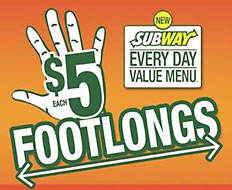With the housing market still depressed, food prices on the rise, and unemployment hovering above 9 percent, some economists now fear that the nation is on the verge of entering a second round of recession, if it hasn’t already.
While the prospect of a “double dip” into recession should have restaurant operators concerned, many say the Great Recession that began in 2008 adequately prepared them for the worst.
“With regard to a second round of recession, we know that our customers have traditionally been value-conscious, and this was something that we were aware of before the first round of recession,” says Subway spokesman Les Winograd. “In fact, we introduced the $5 Footlong price point back in 2008, before people even began talking about recession, and value continues to be a large part of our marketing message.”
In other words, Winograd is saying the chain, which recently hit 35,000 locations around the world, isn’t about to change course to counteract a double dip that may or may not occur.
Chipotle spokesman Chris Arnold says the same is true at the “Food with Integrity” chain.
“During the last downturn, we kept focused on the things that drive our business, and continued to open restaurants believing that it would make our business stronger,” Arnold says. “We are continuing to do those things now, but aren't going to speculate as to where the economy might be heading.”
Tim McIntyre, spokesman for Domino’s, told QSR in an e-mail that the Great Recession proved to the company that even during tough economic times, the quick-service industry could succeed based on its value promise.
“Eating out is a big part of consumers’ ‘food dollar’ and lately, inflation for grocery store food has been higher than restaurant food, so restaurants are able to give many consumers better value,” he wrote.
McIntyre pointed out that Domino’s ended 2010 with a same-store sales increase of 9.9 percent for the year, “making it one of our best sales-growth years yet.” The “value perception” of pizza makes it a popular item during hard times, McIntyre wrote, “because you can feed a family of four for around $20.”
This faith in the trade-down, in which cash-strapped consumers choose to eat out at lower-priced restaurants rather than not eat out at all, extends from global brands like Subway, Chipotle, and Domino’s to smaller quick-serve chains.
“I don’t think people look at us as an extravagance,” says Dave Vernon, vice president of franchise sales at Wingstop, which has 600 stores open or under development in 27 states. “Typically, when times get tougher, people tend to trade down … so I think we’re in a very enviable position.”
In the face of a possible double dip, Wingstop “does not want to get complacent,” Vernon says. “We see [the pace of expansion] increasing,” he says. “With eight years in a row of positive sales, we are getting a tremendous amount of franchise interest.”
While such widespread confidence may seem odd at a time of general anxiety regarding the economy, quick serves have learned valuable lessons during the lean years of the Great Recession, says Darren Tristano, executive vice president of restaurant consulting firm Technomic.
“Operators have done a very good job of managing their costs, including the costs of food and labor,” Tristano says. “They’ve learned to manage the challenges of value and how value relates to price points. They’ve done so many things to compensate for the economy and the downfall in traffic that they’re probably as prepared as they need to be.”
One brand that made a lot of changes during the recession is Rising Roll Gourmet, a 14-unit concept headquartered in Atlanta. CEO Mike Lassiter says he introduced a three-pronged strategy that included a customer-service program (“Hug A Customer”); a modified pricing system where customers could order à la carte; and a multiple-distribution system that raised revenue through catering, express units, and pop-up service in office buildings in addition to in-store sales.
Having figured out how to weather the historic financial storm of the last few years, Lassiter says he feels confident about facing future setbacks.
“If we have another dip, we think we’re poised to do very well during the next recession,” says Lassiter, who expects to hit 20 stores by the end of the year.
That sentiment echoes in the halls of the National Restaurant Association, which expects the industry to hit $604 billion in sales this year.
“Consumers’ pent-up demand for restaurants remains high, so it’s obviously essential to their lifestyle and daily existence,” says Hudson Riehle, the NRA’s head of research.
In the end, Riehle says, “it’s easier to go out and buy a restaurant meal than it is to upgrade your automobile or buy a new kitchen appliance.”













